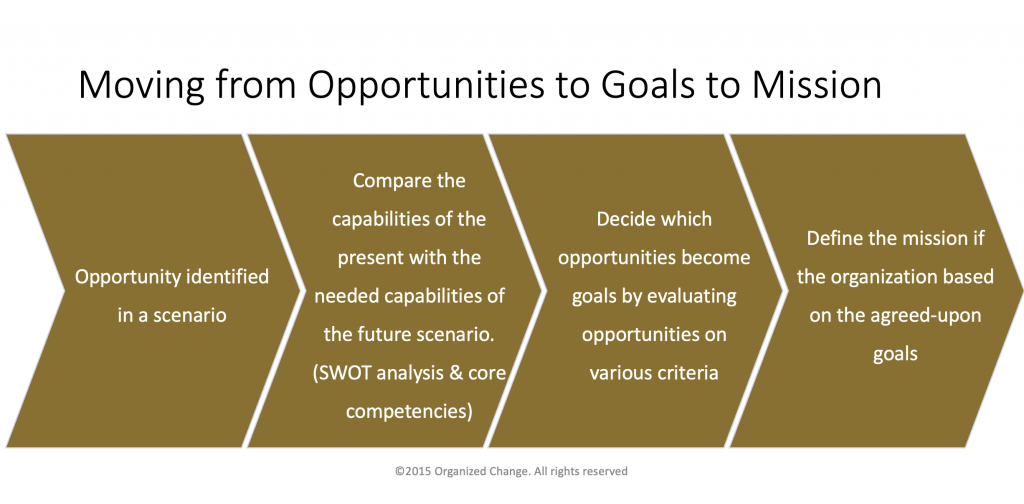An organisation needs a purpose, direction, and goals but creating a a vision isn’t the way to do it, says David Chaudron
I hate to tell you how many hours I have spent with clients trying to develop organisational vision and mission statements. It’s a good thing if you’re paid by the hour, like most consultants are, but it is frustrating for everyone.
I’ve come to the conclusion that developing an organisation vision is a bad idea. Let me tell why.
Often, a vision statement – even after much word-smithing – turns into a statement describing what the organisation wants to be. That’s great, but please tell me, how is that different from a mission?
This is where the confusion and off-times frustration starts. Let’s look at some examples:
One of the most classic visions is that of Martin Luther King Jr’s ‘I have a dream’ speech (in part):
‘I have a dream that one day this nation will rise up and live out the true meaning of its creed… We hold these truths to be self-evident, that all men are created equal… I have a dream that one day on the red hills of Georgia, the sons of former slaves and the sons of former slave owners will be able to sit down together at the table of brotherhood.’
Below, I have included vision statements that range from virtual meaninglessness, to how the organisation should operate, to how the world should be.
Caterpillar:
- Be the global leader in customer value.
Avon:
- To be the company that best understands and satisfies the product, service and self-fulfillment needs of women – globally.
GM:
- GM’s vision is to be the world leader in transportation products and related services. We will earn our customers’ enthusiasm through continuous improvement driven by the integrity, teamwork, and innovation of GM people.
Coca-Cola:
- People: be a great place to work where people are inspired to be the best they can be.
- Portfolio: bring to the world a portfolio of quality beverage brands that anticipate and satisfy people’s desires and needs.
- Partners: nurture a winning network of customers and suppliers, together we create mutual, enduring value.
- Planet: be a responsible citizen that makes a difference by helping build and support sustainable communities.
- Profit: maximise long-term return to shareowners while being mindful of our overall responsibilities.
- Productivity: be a highly effective, lean and fast-moving organisation.
If vision statements are vague, they are meaningless or can sound more like high-level organisational goals.
At the other end of the spectrum, if vision statements sound more like how the organisation wants to operate, it is just as confusing.
This confusion is great for a consultant. We get to charge endless hours facilitating management sessions while people debate these issues, and then spend lots of time word-smithing every comma and colon.
Please also note in the above examples, that they are not a vision of the future, as in Dr King’s example.
Certainly, an organisation needs a purpose, direction, and goals. I’m just saying a vision isn’t the way to do it.
Let me propose something different, and a method to do it.

1I suggest that the first thing any organisation should do is develop scenarios of what might happen the future. It’s easy to get stuck on something ideal and try to achieve it, but that rarely happens.
Something that rhymes with ‘hit’ that usually hits the fan.
How do develop these scenarios is the topic of much literature and conversation. Let’s limit it here to encouraging companies to develop several what-if scenarios of what environment that might come about in X years.
2Second, given these scenarios, brainstorm opportunities that might be advantageous to the organisation, and then develop a statement of what over-arching goal the organisation should accomplish.
This over-arching goal should either include measures of success, or easily be operationalised at a later time. After this is done, put the title of ‘Mission’ on it. Potentially different scenarios might require different mission statements. Why you ask? Because a mission may be untenable if scenario X comes about, but may be just dandy if another occurs.
3Third, develop possible strategies that will allow the organisation to achieve this overarching purpose in the scenarios they just developed. These strategies will need to be further operationalised further and further, providing greater detail to smaller and smaller pieces of the organisation. The little word called ‘stakeholders’ at each iteration needs full consideration.
4Fourth, develop or refine the systems needed to accomplish these strategies. These systems include organisational structure, IT, human resources, selection, development and motivation and support functions. As part of this, develop guiding principles (ethics if you like, or values if you insist) as to how the human elements of the system should and shouldn’t operate.
5Fifth, develop an implementation plan, taking those pesky stakeholders into account.
6Sixth, gee whiz, do something, will ya!
Implement, monitor, and revise according to that plan you just developed.
And of course, hire a consultant to help you through this. Given what you know now, maybe you won’t have to be charged quite so many billable hours.
Dr David Chaudron is Managing Partner at consultancy Organized Change.

He has more than 30 years’ experience. National and international clients include those in manufacturing, banking, finance, petrochemicals, electronics and aerospace in the US, France, Germany, Portugal, Brazil, Saudi Arabia and Kuwait.
He has spoken at numerous national and local conferences and been a major speaker at internationally broadcast teleconferences to over 35,000 people on organisational change, TQM and Re-engineering, systems thinking and strategic planning.
He holds doctorate and master’s degrees in industrial/Organisational psychology.



